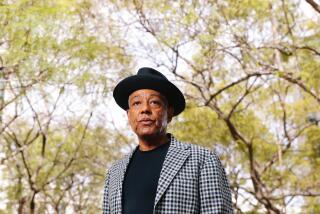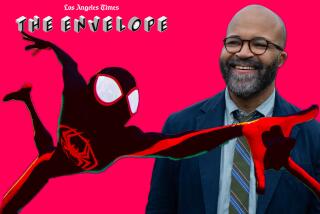Groucho Is Secret Word for Actor Ferrante
Frank Ferrante has a thing for Groucho Marx.
“I was almost weaned on tapes and records of him,” said the 26-year-old actor. “I knew his inflections, I knew his rhythms. I read everything I could on him. And I think my love for the subject comes through.”
Ferrante’s tribute--and impersonation--is at the core of “Groucho: A Life in Revue,” a musical bio/character study written by Arthur Marx (Groucho’s son) and Robert Fisher. Under Marx’s direction, it opens Sunday at the Pasadena Playhouse.
It all began in 1984, when Ferrante decided to mount a one-man Groucho show in a church hall in his hometown of Pasadena. It went so well that, the next year, he replicated it for his senior project at USC.
“I figured I might as well capitalize on it--combine my drama degree and my interest in the Marx Brothers,” he reasoned. This time, however, he invited Groucho’s offspring, Arthur and Miriam. And they loved it. But mostly, they loved him.
“Arthur said, ‘If I ever do a show about the Marx Brothers, I’d like to use you,’ ” Ferrante recalled. The year after he graduated, they began workshopping the show. In the resulting version (completely different from Ferrante’s original piece), the actor plays Groucho at four stages in his life: as a 15-year-old innocent; a the-other-morning-I-shot-an-elephant-in-my-pajamas comedy and film star; the older “You Bet Your Life” Groucho, and the 85-year-old cynic.
A Kansas City production came first, followed by an 11-month New York run (culminating in a 1987 Theatre World Award)--and last year, a London engagement.
“There’s a lot of humanity in the show,” Ferrante said. “It’s more than a couple of guys doing the Marx Brothers. There are 10 songs, a plot, a story. It’s about his relationship with his brothers, his wives. Les Marsden plays Chico--and he also plays the harp as Harpo. Anastasia Barzee plays 13 different roles: chorus girls, wives, reporters, a USO girl. . . .”
Ferrante is convinced the fascination with Groucho is ever-strong.
“Look at his movies--they’ve never left the public scene,” he said. “You still see his TV reruns. At this show, we get audiences from 7 to 90. Little kids come up saying, ‘I love Harpo.’ I can’t tell you how many letters I got from people in Europe when I was in London. There are Marx Brothers fans everywhere. I really think he touched a nerve: He was the funniest man America ever produced.”
Ferrante traces his own Groucho attraction to early childhood.
“When I was 10, I was watching ‘A Day at the Races,’ ” he said. “It really appealed to me visually; they were so undisciplined and irreverent.”
Besides dressing up as Groucho on Halloween, Ferrante fostered a Groucho memorabilia collection that included posters, books, records, films and a scrapbook of clippings.
“Then two years ago, Arthur took me to a Bekins warehouse and there (were) 85 years of Groucho’s life: awards and scripts, photographs, wigs, props. He gave me the glasses Groucho wore, a cigar box, some hats. . . .”
He also cherishes the memory of a 1976 meeting with Groucho (a year before the comedian’s death), when Marx held a book-signing session at the Ambassador Hotel.
“(Groucho) shuffled up to the podium, his eyes were glassy, he was slurring his words,” Ferrante said, wincing. “I thought, ‘My God, my hero from “Duck Soup”--and he’s ancient . How could this happen?’ ” Yet within minutes, the familiar, wisecracking Groucho bubbled to the surface.
“He was able to muster up those reserves of energy and perform. Then he just shuffled off. It’s that memory of him that I think of when I’m playing him old.”
Despite his obvious affection for his subject, Ferrante thinks the show is more than a glossy tribute.
“It’s not a ‘Mommie Dearest,’ ” he said. “But it’s not a whitewash of his life, either. It’s honest. See, I know all of his flaws. There were obviously severe problems with women--he had three divorces--stemming from his relationship with his mother.
“He was very eccentric with his money, probably because he’d lost $250,000 in 1929. And he wasn’t always apt to give love freely. But he was an extremely loyal friend, a hard worker. His kids say he was a great father when they were young. But he had a very insecure streak.”
The actor denies any insecurities about work that requires submerging his own identity to Groucho’s.
“I know he’s the focus,” Ferrante said. “That’s OK. If audiences go away with a respect for the work, that’s what’s important. I don’t sit around saying, ‘Gosh, I wish I were like Groucho.’ That’s never been a problem. I like myself too much to give myself over to that.
“But this is the perfect time to do this; I’m at an age where it’s good, not destructive. And when I get home, I don’t do Groucho. I almost make a point of avoiding the wisecracks. I don’t care about being ‘on.’ It doesn’t matter to me.”
He’s convinced that there’ll be life after Groucho.
“If this production goes well, I’d like to do it in Boston, San Francisco, Chicago, Philadelphia and Washington--and then move on to the next job,” Ferrante said. “Oh, I wouldn’t mind doing the film version, because his story’s never been told.”
There are no regrets for the detour: “When I graduated from USC, I was about to enter UCLA’s theater production program--and this show came up. I figured it was too good an opportunity to miss. And I was absolutely right.”
More to Read
The biggest entertainment stories
Get our big stories about Hollywood, film, television, music, arts, culture and more right in your inbox as soon as they publish.
You may occasionally receive promotional content from the Los Angeles Times.










